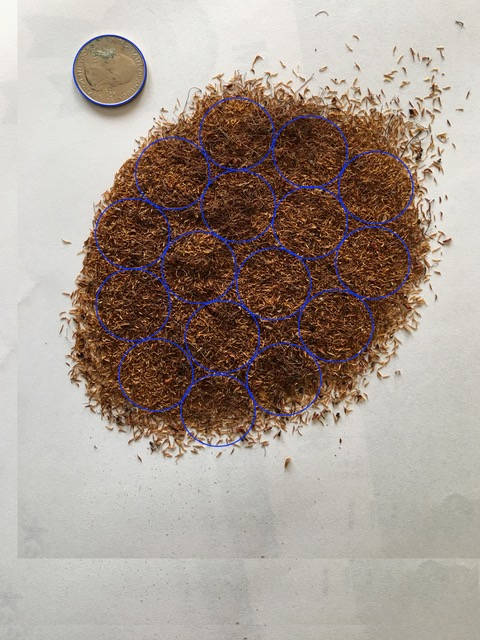Ohia seed collection a success
LIHUE — A team of volunteers, state officials and county organizations combating rapid ohia death has just finished their first-ever seed-collecting event, and organizers are hailing it as a success.
The group collected 195,353 seeds during their first outing, which took volunteers to the Waimea Canyon for a short, one-third-mile loop on a trail that wanders through native plants including plenty of ohia.
Kim Rogers, who leads the seed-collection outings in combination with botanists and members of several state and non-governmental organizations, said they were encouraged by the number of seeds collected.
“I gotta admit, I had no idea we’d collected that many,” she said.
Rapid ohia death, or ROD, is a disease that impacts Hawaii’s native ohia trees, killing them. It’s caused by two different strains of a fungus — one more aggressive than the other — and both strains have been found on Kauai.
Ohia die for many reasons, although symptoms consistent with ROD include the sudden browning of leaves on limbs or the entire crowns of trees. The fungus is not visible on the leaves or the bark, but grows in the sapwood just below the bark, and impacts the flow of water in the tree.
Since the disease was identified on Hawaii Island in 2014, more than a million trees have died — with more than 90 percent of those testing positive for C. lukuohia, one of the strains of the fungus. On Kauai, the number of trees that have tested positive for C. lukuohia is much lower than on Hawaii Island.
Since it was first detected on Kauai in 2018, some 141 trees have been sampled. Of those, 22 have tested positive for C. lukuohia and 37 for C. huliohia.
Seed-collecting started as a way to help add to the seed bank and contribute to research on the trees and disease.
Since the first seed-collecting outing in mid-August, ROD has been discovered in two more areas on Kauai — in Wailua on Powerline Trail and mauka of Kalaheo and Lawai.
“It’s super-important to practice bio-security and to collect seeds for conservation use — seed-banking,” Rogers said Friday in a release about the seed-collection outing.
Education on bio-sanitation measures has been circulating through the public as officials try to stop the spread of ROD.
Boot brushes have been installed at numerous trailheads around the island, and bio-sanitation kits are available from the Kauai Invasive Species Committee. Information is available online about the steps to take to clean shoes, vehicles and tools after being in Hawaii forests or working with ohia.
Anyone interested in getting a bio-sanitation kit should email saveohia@hawaii.edu or call 821-1490. Each kit contains a boot brush, bottle of isopropyl rubbing alcohol, and educational literature. This bio-sanitation video provides a demonstration of these simple decontamination practices.
The next seed-collection outing is scheduled for Saturday, Sept. 21. Meet at 1 p.m. at the lliau Nature Trail located between mile markers eight and nine on Kokee Road. Anyone interested in joining the seed collection should email Rogers at kimsr@hawaii.edu and RSVP by the end of day on Tuesday, Sept. 17, and Rogers will supply more information.
•••
Jessica Else, environment reporter, can be reached at 245-0452 or jelse@thegardenisland.com.


So they collect all those seeds, but who will germinate them and turn them into seedlings and then reforest? More feel good stuff that doesn’t actually solve the problem.